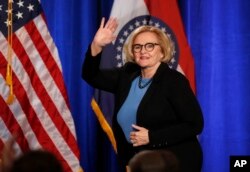At least 95 women won seats in the U.S. House of Representatives during Tuesday’s midterm elections, easily eclipsing the previous record of 84 women in the lower chamber.
Most of the women who won congressional seats were Democrats who helped propel the party to a majority in the House. Nearly 80-percent of the women who competed in House races were Democrats, according to the Center for American Women and Politics at Rutgers University.
A record 237 women ran in House races across the country, with nearly 100 emerging as winners by Wednesday morning, the center said.
When the next Congress convenes in early January, House Democrats will be in the majority for the first time in eight years.
Victories by women are likely to boost their representation in Congress beyond 20-percent for the first time. Many stepped up as candidates in the last two years, energized by reports of Trump's behavior toward women, the rise of the #MeToo movement that has publicized the pervasiveness of sexual assault, and Republican policy platforms on issues including abortion rights.
Christopher Borick, a political science professor and director of the Muhlenberg College Institute of Public Opinion, says the role women played in this election lived up to expectations.
"We're seeing a vast increase in the percentage of women that will be within in the House of Representatives. I'll give you an example in Pennsylvania, which is kind of the one of the most striking scenes. Before this election we had zero, not one member of an 18-seat congressional delegation that was a woman. Tonight, just in suburban Philadelphia, in the Lehigh Valley where I'm speaking from, four women won in a really tight area," Borick said.
Winners also included the first two Muslim women in Congress, Ilhan Omar from Minnesota and Rashida Tlaib from Michigan, and the first Native American woman, Sharice Davids from Kansas. First-time female congressional candidates also won in states including Pennsylvania, New Jersey and New York.
A record 33 House races featured women opposing other women. Democrat Donna Shalala, a former Cabinet member in President Bill Clinton’s administration, beat Republican Maria Elvira Salazar, a journalist of Cuban descent.
Democratic women did not have the same success in the Senate as they did in the House.
Incumbent Senator Claire McCaskill of Missouri was defeated by state Attorney General Josh Hawley. And Senator Heidi Heitkamp lost her re-election bid in North Dakota.
Some Republican women won key Senate races, including U.S. Representative Marsha Blackburn, a self-described “hardcore, card carrying conservative.” Blackburn became the first woman to win a senate seat in Tennessee, defeating former Democratic governor Phil Bredesen.
Women were also victorious in gubernatorial races, which are significant in light of the influence governors will wield in upcoming redistricting fights.
In Kansas and Michigan, Democratic women won gubernatorial contests that had been held by Republicans.
Political gains by Democratic women were particularly noteworthy in Michigan, where they won every major statewide office. In addition to the governor’s seat, they won races for U.S. senator, attorney general and secretary of state.
When the 116th Congress convenes in January, women will have more political power in the House. House Minority Leader Nancy Pelosi, who easily won re-election Tuesday, was expected to announce her run for speaker on Wednesday. Pelosi previously served as speaker, the only woman every to hold the powerful post.
CNN's exit poll indicated 80 percent of voters said it was important for more women to be elected.
Many of the political gains by women came in Republican-controlled suburban districts where Trump’s popularity has declined, allowing Democrats to recapture some power in Washington.







